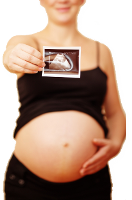Varicose Veins and Pregnancy
| Share: | Tweet | Thank You! |
It is still not clear whether pregnancy actually causes varicose veins or just makes existing veins a lot worse. We do know that a lot of people have leaky valves from an early age (about 1 in 20 schoolgirls according to some studies). Current thinking is that these early leaky veins don't cause a lot of trouble until people are a lot older or until something like pregnancy accelerates the problem.
There are thought to be two main reasons why pregnancy makes a leaky vein worse. The most obvious is the size of the enlarged uterus in the later stages of pregnancy, which tends to press on the veins in the pelvis and restrict blood flow from the legs. This increases the pressure on the leg veins and worsens any leaking valve.
In addition to the mechanical effect of the heavy uterus, we know that as pregnancy progresses, the female body produces hormones which make all the ligaments and tissues relax in order that the baby can pass through the birth canal. These hormones also have an effect on the veins in the legs, making the muscle in the vein wall relax, which in turn causes the veins to enlarge naturally, also increasing the risk that they will become varicose.
Varicose veins can cause quite a lot of problems in the later stages of pregnancy. Heaviness and aching of the legs and a condition called phlebitis are the most common complaints. Phlebitis is a sudden onset of hard and tender lumps in the veins caused by localised little clots in the vein which can really be quite painful. They aren't particularly dangerous and usually get better on their own with simple painkillers but repeated phlebitis can be a real nuisance.
Because we don't like to operate on pregnant patients unless absolutely necessary, the treatment of varicose veins in pregnancy is mainly by the use of compression stockings. These need to be of decent quality and also properly measured to fit correctly. Getting stockings to hold up on the leg is a constant problem so tights are usually the best solution for the final stages of pregnancy. Painful phlebitis can be managed with use of low dose anti-inflammatory creams, which are completely safe for the baby.
Once pregnancy is over the veins will usually subside quite a lot although not completely go away. For this reason we usually recommend treatment of veins before a second pregnancy for ladies who have had difficulties with veins first time around. Fortunately treatment for varicose veins these days is a lot quicker and easier than it used to be - vein specialists now use the most advanced minimally invasive 'keyhole' techniques that can fix veins without the need to put patients to sleep or without the need to make large incisions in the legs.
| Share: | Tweet | Thank You! |


 Community
Community




